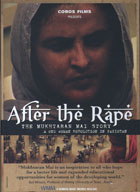
After the Rape 2008
Distributed by Women Make Movies, 462 Broadway, New York, NY 10013; 212-925-0606
Produced by Cobos Films
Directed by Catherine Ulmer Lopez
DVD, color, 58 min.
Sr. High - Adult
Human Rights, Middle Eastern Studies, Multicultural Studies, Women's Studies
Date Entered: 06/10/2010
Reviewed by Patricia B. McGee, Coordinator of Media Services, Volpe Library & Media Center, Tennessee Technological UniversityIn 2002 a neighboring village council ordered that Mukhtaran Mai, an illiterate peasant living in a distant part of Punjab, be gang raped as punishment for an alleged affair her brother had with a woman of that tribe. Mukhtar refused to be a victim; she “fought against the culture of silence and shame,” demanded justice and took her case to the Pakistani courts. In the process she became an international symbol of the struggle of women to gain justice in the developing world. She founded two schools to educate girls for “when boys and girls go to school, they will be more educated and wiser.” Today the schools educate hundreds of girls who prior to this would have had no hopes or expectations for their future, and Mukhtar says “the girls and the school give me the courage to fight back.”
This remarkably courageous woman also established a crisis center where women victims of abuse come from all over Pakistan seeking Sister Mukhtar’s help. Their stories are horrific—a five year old girl murdered by insecticide placed in her eyes and on her face; a woman gang raped as punishment for the alleged offense of a male family member; an eleven year old kidnapped into a forced marriage. Mukhtar’s struggle to “end violence through education” has made her a target of death threats.
Before the girls begin their school day, they must do the household chores that are typically considered women’s work in a rural community—cooking, cleaning, and washing. Sidra, in her seventh year of school, aspires to be a doctor and a leader of her country. Sidar’s father wishes her to become educated for “education is a treasure,” and her parents have promised that they will not make her marry until she has become a doctor. Sidra wants to “raise the values of my nation,” but she knows that lack of education and violence, particularly sexual violence against women, are used as tools to keep them under the control of men. After the Rape ends heartbreakingly with the arranged marriage of Sidra to an older man; the final shot is Sidra in her wedding finery, with elaborate eye make up and henna designs on her hands and feet, looking absolutely miserable.
Mukhtar Mai has both the strength and faith to persevere against injustice and violence, but changing attitudes is extraordinarily difficult. After the Rape a sensitive, thoughtful examination of a very difficult subject, is a must have for programs in women’s studies and Middle Eastern studies as well as for multicultural programs.